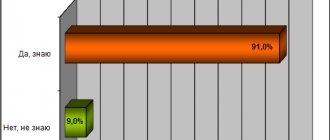Home / Tax benefits and deductions / Which utilities cannot be disconnected for debts
For the most part, Russian citizens pay utility bills in good faith, regardless of financial difficulties. But rising tariffs and the unstable economic situation in the country sometimes deprive people of the opportunity to pay for utilities. The resulting debt leads to litigation and sometimes even power outages .
Do you know whether it is legal to shut off utilities for non-payment?
Suspension or restriction of public services is a fairly applicable practice; there are cases when the contractor suspended water drainage by installing a plug and sealing the drain pipes; as a rule, in the case of such a restriction/suspension, debtors paid for utilities on the same day or the next, since the water from their the apartment did not leave, and they were deprived of the opportunity to use the sanitary equipment in their premises completely. There are also cases of power outages, this is especially true in houses equipped with electric stoves. First of all, in order to protect the executor, it is necessary to correctly draw up a notice to the debtor and check for errors in the accruals. If the contractor fulfills all the conditions provided for in Decree of the Government of the Russian Federation No. 354 of May 6, 2011, then there should be no risks.
Is it legal to turn it off without a court order?
The legislation of the Russian Federation provides for the liability of the management company for illegal water shutoffs:
- Administrative responsibility. In this situation, officials must pay a fine in the amount of 500 to 1000 rubles, and legal entities from 5 to 10 thousand rubles. The above measure is applied by regulatory authorities. However, before this they must establish the fact of a violation (article number 19.1 of the Code of Administrative Offenses);
- Criminal liability. It is established by the court in a situation where the owner of real estate has suffered moral or material harm. In this situation, the supplier will have to pay a fine of up to 200 thousand rubles. In addition, he may be imprisoned for up to three years. If a person dies as a result of illegal actions of representatives of the management company, he can be imprisoned for up to five years. Plus, he is prohibited from holding leadership positions for three years;
- For arbitrariness, a fine of 80,000 rubles (or six salaries) will be imposed. Also, in this situation, the perpetrator may be sentenced to forced labor for 200 hours.
If it is proven that the debtor was threatened, the perpetrator will be imprisoned for six months. In exceptional situations, the term can be increased to five years (articles numbered 215 and 330 of the Criminal Code of the Russian Federation).
In a situation where the fact of illegal water supply is proven, representatives of the management company must restore the water supply within three days and also make a recalculation.
The procedure for turning off water to dishonest or unscrupulous consumers of utility services without a court decision is absolutely legal. But only on strictly defined grounds listed in Government Decree No. 354 (clause 119, paragraphs a, b, c): if there is a debt in the amount of two monthly payments according to the standard and its non-payment, improper maintenance of hot water communications in the apartment, illegal connection.
Turning off cold water is unacceptable under any circumstances. This is explained by the fact that the constitutional rights of the citizen will be violated, and the sanitary well-being of the entrance or home will also be endangered.
Disconnection cannot occur spontaneously or suddenly; this should be discussed in more detail. It is planned 30 calendar days before the service is disconnected. The HOA is sent to the debtor by mail 30 days before the expected date of restriction of the provision of utilities. It happens like this:
- details of the debtor - his full name, address of the premises where the debt arose;
- account number;
- the period during which debts for utility bills have accumulated;
- amount to be paid;
- The date by which the debt must be repaid.
If the debtor did not react in any way to the letter received and did not pay at least part, then the Criminal Code has the opportunity to restrict the filing. You don’t have to worry about cold water - turning it off is not allowed. And hot food is limited in consumption for a month. If during this period the owner of the apartment building does not pay at least part of the debt, then a disconnection occurs.
This does not mean that nothing needs to be done now. Shutting off the water in your home does not mean that the need to pay bills has disappeared, or that the debt has been written off or forgiven. The HOA takes the apartment owners to court in order to recover all costs and debt. It will consist of all the costs that Vodokanal incurred in trying to repay the full amount of the debt. It will include not only the water spent on the meter, but also fines and penalties for non-payment, costs for a courier to deliver letters, and possible costs for shutting off the water in the basement of the house. In all cases, it is better not to wait for a court decision and start paying the debt.
When the management company applies for a court verdict:
- No payment for 3 consecutive months of using the service for one year. The amount that has accumulated during this time does not matter and may be negligible.
- The owner of the premises was notified of the upcoming measures in the correct manner.
If the employees of the management organization do not have a document in their hands in which the owner is notified of the upcoming restrictions, then disconnection is impossible. The HOA and Vodokanal cannot turn off the water - they have no evidence of the awareness of the owner of the living space. The court considers each case in detail, finds out the reasons why the payment violation occurred.
If there are good reasons, the case is considered in more detail, additional hearings may be scheduled, the terms of settlement with the utility organization may be extended, and penalties and fines will be waived. If the refusal to pay is made intentionally, then the owner is obliged to pay the service provider in a short time.
In cases where the actions of the management company are unlawful for any reason: turning off cold water along with hot water, shutting off the pipeline in the entire house due to one tenant, or committing other unlawful actions, the citizen must react as follows:
- Send a letter to the Management Company containing a written request to return the supply of the service and recalculate it for the time when it was not available.
- When the water in the tap does not flow within three working days, you need to write a claim and send it to three places - Rospotrebnadzor, the Criminal Code and the district prosecutor's office.
In the event of unlawful actions, the homeowner has the right to write a request to the magistrate’s court and demand restoration of the supply of services along with moral compensation. It is important to attach supporting documents - witness statements, photos or videos that will confirm the fact that there is no water in the tap.
We invite you to read: What the Internal Revenue Service does not have the right to request
The fine can increase to 200,000 rubles or 3 years in prison. If a water supply shutdown results in the death of a person, the term of imprisonment may increase to 5 years. The head of the organization is banned from holding leadership positions for 3 years. Arbitrariness is punishable by a fine of up to 80,000 rubles.
Procedure and features of power outages for non-payment of utilities in 2020
If the disconnection occurred improperly, the subscriber can file a complaint against the company’s actions, and in addition, it is possible to force the management company to reimburse the cost of moral damage in court. In accordance with Article 546 of the Civil Code of the Russian Federation and Government Decree No. 354, it is not allowed to turn off the power supply without prior notice to the user. If a citizen has not received a notice from the Criminal Code about a possible suspension of electricity supply, he can:
Rights of management companies to turn off power in case of debts
- disconnection of a utility service must be proportionate to the violation committed by the owner. For example, if the debt is only 300 rubles, then you cannot turn off the light because of this, because turning it off will deprive a person of the opportunity to live comfortably in the apartment;
- Disabling the service cannot go beyond the actions that are necessary to eliminate the violation of the law. In other words, disconnection is possible only when there are no other mechanisms of influence on the debtor. For example, a management organization must warn a person about the debt that has arisen and provide him with a deferment or installment plan to pay for utilities. Only after the possibilities for a “peaceful” solution to the situation have been exhausted can utilities be turned off;
- disconnecting a utility service should not pose a threat to the life and health of others. This means that shutting off a utility service cannot cause harm to persons who are not debtors. For example, a single mother with a child lives in an apartment. The owner of the apartment is the mother and she must pay for utilities. It often happens that when there is no money, debt arises. Turning off the water in this situation jeopardizes the child’s health, so turning off the water is impossible.
This is interesting: What is the Retirement Age in Russia from 2020
Judicial practice on disconnecting housing and communal services
Due to the ambiguous interpretation of the legislation in order to apply it uniformly in practice. On June 27, 2017, the Plenum of the Supreme Court of the Russian Federation adopted the Resolution “On some issues of consideration by courts of disputes regarding payment for communal services and residential premises occupied by citizens in an apartment building under a social tenancy agreement or owned by right of ownership.”
The document provides for a number of cases in practice when it is necessary to suspend or limit the consumption of housing and communal services in connection with the formation of debt. The act of the highest court in civil cases of Russia is not binding, but it sets out recommendations for the application of legislation by authorities.
You can’t turn off heat and water even for debts
- The company supplying the resource sends a notice to a specific consumer indicating the amount of debt. If the presented invoice is not paid within a month, a temporary restriction on the provision of services is introduced;
- When payment is not received, the service is subject to permanent termination. And, in this case, the consumer receives a notice in which three days are allocated to liquidate the debt;
- This is followed by sealing of equipment, inside or outside the home, metering devices related to a particular service;
- Seals should be removed free of charge when repaying a debt, however, in practice situations arise when persons reconnecting the service make demands for payment for their work.
What to do if the water is turned off illegally
It is illegal to cut off the supply of cold water. In this and other cases when the consumer believes that the actions of the resource supply company are beyond the scope of its authority, he should do the following:
- write a statement to the Criminal Code containing a demand to resume water supply;
- if nothing happened over the next three days, file complaints with Rospotrebnadzor and, at the same time, with the prosecutor’s office.
Also, nothing prevents you from going to court, but this method is not very effective, since the consideration of the claim takes a lot of time.
Power cut off for non-payment of utilities
In addition, disconnecting a utility service should not pose a threat to the life and health of others. This means that service disconnection cannot cause harm to persons who are not debtors. For example, if a mother and child live in the apartment. The owner of the apartment is the mother and she must pay for utilities. It often happens that when there is no money, debt arises. Turning off the water in this situation jeopardizes the child’s health, so turning off the water is impossible.
This is interesting: What benefits do Karelia labor fans have?
Signs of legality of the shutdown procedure
It is especially important to understand how water is turned off for non-payment in one apartment. The country has Rules for the provision of public services, which were adopted more than 5 years ago, and all companies involved in this area are required to follow. This document, in particular, regulates the procedure for turning off water in residential and non-residential premises due to non-payment of outstanding payments for utility services.
Before disconnection, the debtor is notified of upcoming measures for non-payment
If the issue does not fall under exceptional cases (for example, if there is a minor child in the family, turning off electricity, water and sewerage is prohibited), then the procedure is as follows:
- The company providing the service is obliged to send the debtor a written notice of its intention to suspend water supply due to existing non-payments. The document displays the total amount of debt and the period for which it was formed, as well as a schedule for the upcoming shutdown. The warning can be sent by registered mail, or it can be delivered personally to the homeowner against signature.
- If the debt is not repaid within 20 days, the company blocks access to hot water supply. The period begins to count from the moment the notice is delivered. If it was not delivered personally, then the date on the postmark is considered to be it.
- Employees of the supplier company seal the plumbing equipment inside the apartment, which is used to supply hot water.
In a private house, the procedure is the same as in an apartment building. If residents pay off their debt, they must submit a written application to the management company with a request to restore the disconnected service. It takes 3 business days to restore water supply. To avoid future ambiguities, it is better to draw up the application in two copies.
All debtors should know that placing and removing seals is a free procedure. Management company employees should not demand money for carrying it out. If this happens, then such manipulations are again a serious reason for going to court.
If the apartment has limited access to water supply, the owner can contact the management company with a request to restructure the debt. As a rule, management company employees are cooperative and, after making an advance payment, the water supply is restored.
Paying off the debt will allow the services to be resumed
If residents are confident that the supplier’s actions are unlawful, then they must take a number of actions to resolve the situation:
- First, you should make a claim and submit it to the management company. The form of the document is arbitrary. There are no legal requirements for it or for the form to be filled out. An approximate sample can always be found on the Internet. The application must state the reasons for your disagreement with the shutdown and demand a monetary recalculation for all days when there was no water. And if the employees of the management company do not agree to restore the water supply, then they must be required to submit a written refusal stating the reasons.
- If the utilities do not meet the three-day deadline, the homeowner has the right to file a claim with the prosecutor’s office.
- Having received a written response, you should file a claim with the court asking to restore the water supply to the apartment. It must be accompanied by copies of rent payments and a waiver from the management company.
Residents have the right to file a claim in case of illegal disconnection of services
The claim will need to be accompanied by documentary evidence of the lack of water. To obtain them, you can use photographs and videos, as well as take written statements from neighbors. You can ask the management company’s employees to draw up a report, but they rarely agree to this.
We invite you to read: Confirmation of ownership of a land plot
It should be noted that such a procedure is not possible for homeowners' associations. This is because payment for utility services is immediately withdrawn from all residents of the HOA from its account as a legal entity.
Often, when there is a water outage in a house, you can hear that such actions by suppliers are unlawful. In fact, determining legitimacy is quite easy. Turning off water for non-payment in an apartment building is legal only if a number of conditions are met:
- non-payment of money for water supply services must be for at least three months;
- residents are required to be notified of threatened sanctions;
- turning off water will not violate the rights of persons living in this territory, but regularly paying for services.
There is an opinion that a court decision is necessary to restrict a service. In fact, it is wrong. The supplier has the legal right not to apply to any judicial authorities to carry out shutdown measures.
All other situations, except for emergencies, in which citizens are restricted from accessing public utilities, are considered illegal.
Summarizing the information, we can give a positive answer to the question whether hot water can be turned off for non-payment. Yes, this is possible subject to a number of mandatory conditions.
The restriction of individual utilities for non-payment is regulated by Government Decree No. 354 and is legal.
Disabling hot water, electricity, gas and intercom is possible in case of debt equal to two monthly payments.
Turning off other resources (sewage, cold water, heating) is illegal, as it creates inadequate living conditions in the apartment and can also damage the entire entrance.
The management company that turns off the debtor’s water should make sure that the following measures:
- will not damage common property;
- will not affect the provision of resources to bona fide payers;
- will not violate sanitary standards.
If these conditions are not met, turning off hot water is unacceptable.
The law defines several grounds:
- Accident or natural disaster. This is the main reason for shutdowns without warning.
- The need for scheduled repairs. If we are talking about switching off for several hours, then they must warn about this a day in advance. If about a longer period - in a few days.
- The consumer committed a crime and voluntarily connected to the water supply. For such an action, an order from an authority is required.
- It was revealed that apartment residents were using appliances whose power exceeded permissible limits. The border can be found out from the technical passport of the residential building.
- The commission established the fact of improper maintenance of pipes in residential premises. The law establishes the responsibility of owners for repairs and maintenance of communications inside the apartment. When the poor condition of the pipes threatens the supply of resources to the entire house, services turn off irresponsible owners.
- Unpaid payments.
Residents who, due to various life situations, could owe for the mountains. water, has the right to contact the management of the resource supplying organization to draw up a debt repayment schedule.
Utility services usually do not refuse installment plans, as this is beneficial to both parties. If the schedule is followed and the money is deposited monthly into the RSO account, no sanctions will follow.
If payments for hot water are not received by the utility service, non-payment has accumulated in the amount of two months' payment according to the standard, and the consumer does not try to peacefully resolve the conflict, a decision may be made to turn off the hot water supply.
The management company is obliged to warn the owner about this twenty days before execution. Thus, he is given time to pay off the debt or draw up a debt payment schedule. Moreover, the debtor must be notified properly, that is, the management company must have a copy of the notification with his signature on delivery.
Shutting down without notice is prohibited except in emergency situations.
After 20 days, a hot water supply limitation mode is introduced. If the situation with the unpaid debt has not changed within 10 days, the provision of hot water supply services is terminated.
On the appointed day, a representative of the management company will come to the apartment and weld the pipe. This is possible if the owner voluntarily opens the door and lets him in. Often cunning debtors do not open the door. Then the option of blocking the riser in the basement is possible. In this way, some damage will be caused to the common property of the house, which will be recovered from the debtor through the court, among other fines and penalties.
If there are no legal grounds for turning off the hot water supply, the consumer has a small debt for the month, but the water has been turned off, a number of actions must be taken to restore the supply and punish officials who exceeded their authority.
Where to complain
First, you need to try to resolve the conflict peacefully and write a complaint to the management of the management company demanding that the water supply be restored and recalculated for the period of its absence. If water is not provided, a response must be sent within 30 days and justify the disconnection. In this case, it is necessary to involve government agencies:
- The State Housing Inspectorate is a government body that monitors the work and legality of the actions of public utility services.
- Rospotrebnadzor, which supervises the fulfillment of contractual obligations by commercial organizations, including management companies, and compliance with consumer rights;
- The prosecutor's office is a government agency that initiates an audit of the activities of the Criminal Code and the actions (inactions) of government officials. It makes sense to go there only after completing the previous stages.
- Court. If other authorities have failed to solve the problem, the only option is to file a claim and go to court.
What to write
Complaints to the Criminal Code and authorities are drawn up according to the same model:
- The header indicates the full name of the manager, the name of the addressee, the details of the initiator of the complaint, and his address.
- In the main part, you need to tell in detail at what point there is no hot water, what you did to resolve the conflict and what you are trying to achieve.
- At the end there is a date of compilation and a signature.
We invite you to familiarize yourself with: Rights and obligations of the testator: by law, by will, consequences of non-compliance with the rights and obligations of the testator









